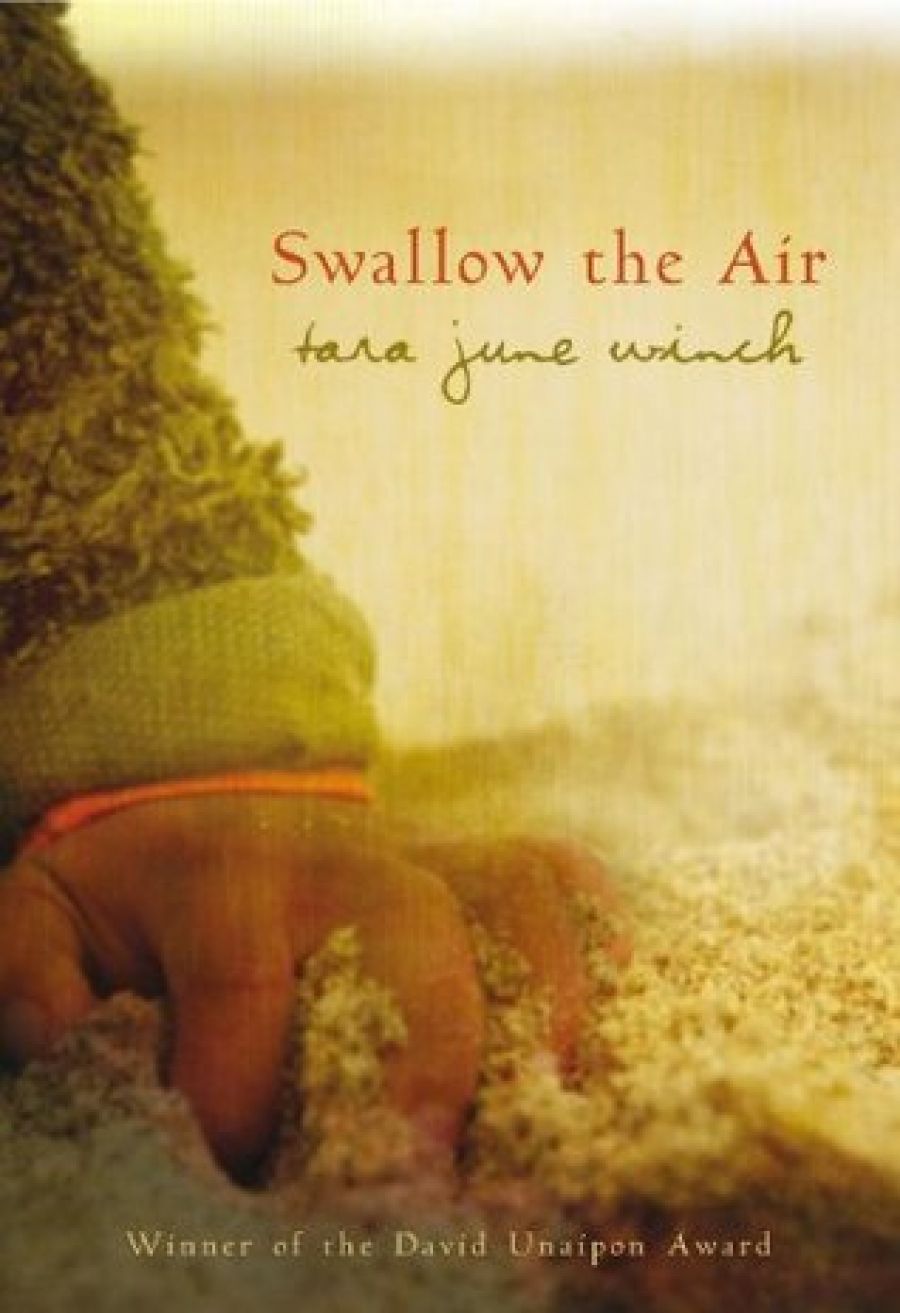
- Free Article: No
- Contents Category: Fiction
- Custom Article Title: Thuy On reviews 'Swallow the Air' by Tara June Winch
- Review Article: Yes
- Online Only: No
- Custom Highlight Text:
Swallow the Air won the 2004 David Unaipon Award for Indigenous Writers. Judging by this slender volume of work, the choice was a judicious one. Thematically, Tara June Winch’s début effort travels along the well-worn path of fiction based on personal experiences, with the protagonist propelling the narrative through a journey of self-discovery. In this respect, Swallow the Air nestles snugly in the semi-autobiographical framework favoured by first novelists, but the sophistication and subtlety of the prose belie Winch’s age; she is twenty-two, but writes with the élan of those much more accomplished. Swallow the Air can either be read as a novel with short chapters or as a series of interlinked short stories.
- Book 1 Title: Swallow the Air
- Book 1 Biblio: University of Queensland Press, $28 hb, 198 pp, 0702235210
- Book 1 Readings Link: booktopia.kh4ffx.net/gj029
Winch herself has an intriguing mix of Aboriginal, Afghan, and English blood; her background not only provides the raw material for Swallow the Air but also invests May’s feelings of rootlessness and belonging with a degree of verisimilitude. It is this desperation to reclaim a sense of pride in her identity that leads May to seek out the more remote branches of her family tree.
In between prose of unvarnished vernacular, Winch offers lyrical sentences that delight in startling metaphorical allusions. May and Billy are shuffled outside by their mother ‘like two jokers in her cards’; random speech shoots about haphazardly like the ‘tearing open [of] birthday cards’, and a dead stingray looks like ‘a fat man in a tight suit after a greedy meal’. There is a singsong, rhythmic tilt to some of the sentences, with Winch favouring a fragmented, elliptical approach. The resulting prose has a poetic resonance that begs to be read aloud: ‘Uncles drinking, thinking under bread and butter. People giving their whole dole to the bowl that is empty, that they turn right over as if they got plenty.’ It comes as no surprise to discover in the biographical notes that Winch has indeed been a spoken-word performer.
Stories about Indigenous communities mired in a cycle of abuse and familial dysfunction are never far from the news, and Swallow the Air presents a composite image of some of the current problems facing those dispossessed. Home for the Gibson family is within Housing Commission flats, ironically called Paradise Parade. One of those neighbourhoods beloved of shock jocks and current affairs shows, it is full of sulking, skulking teenagers, unregistered cars and pawnshops; the sort of place where the stale air of boredom and menace never dissipates. And yet, in one of these ‘slices of scum’, May finds a supportive family during one of her stopovers, even if the social infrastructure of Redfern is about as broken and wretched as they come.
To leaven the potentially depressing focus on scraping together a life on the fringe, there are some lovely episodes of joie de vivre where brother and sister are playing on the beach, searching for pipis in the sandy foam and ‘drunk on salt air and laughter’. It is as though an unspoken permission exists for Billy and May to frolic like carefree children if water were added. However, a sense of poignancy and sadness underlines these moments, not only because of their ephemerality but because they are inevitably overshadowed by the crushing dark forces of drugs, poverty, racism, and violence. That the siblings fear the ocean after their mother’s death reflects their loss of trust and a new-found sense of the fragility of life.
The book is highly respectful of the power of the elements. Air, land, water, and fire are described with a sense of awe. Sensitive to the beauty of the environment, and inspired by her mother’s own stories, May often indulges in imaginative spiels, her dreamings enabling her to avoid ugly realities. Though reconnecting with her past doesn’t provide her with the answers she expects, May ultimately comes to an understanding of the interconnectedness of the cycle of life: ‘we come from the sky and the earth and we go back to the sky and the earth, bone and fluid’.
Tara June Winch is a talent to watch.


Comments powered by CComment